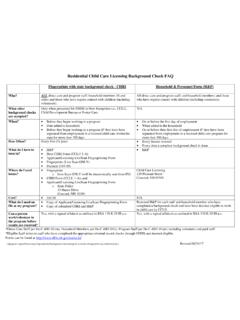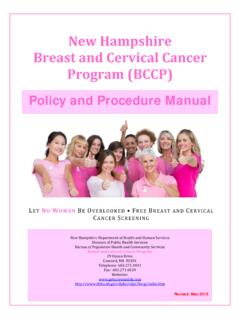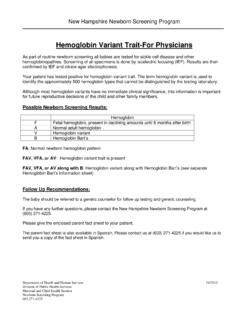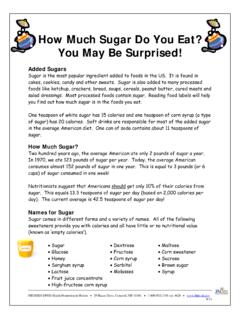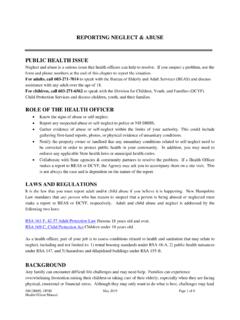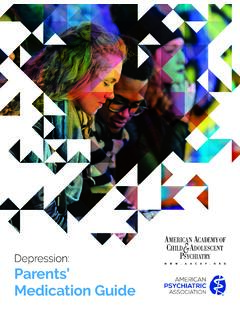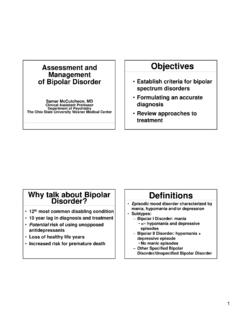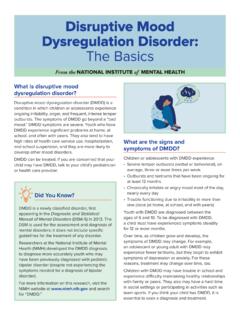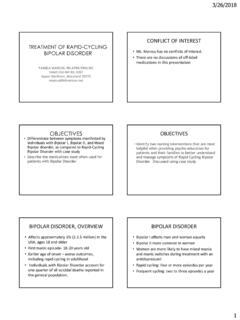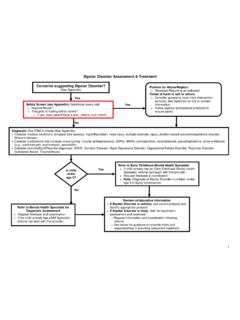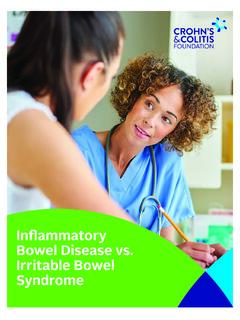Transcription of Behavioral Health Diagnoses, Symptoms, and …
1 B ehavioral Health diagnoses , Symptoms, and Interventions for Children Ages 4 and older Desk reference created October 2013 by Dartmouth Trauma Interventions Research Center for DCYF diagnoses and symptoms based on DSM-5; Interventions drawn from various evidence-based practice guidelines Diagnosis Typical symptoms Behavioral interventions known to work (Evidence-informed; Manualized) *Descriptions provided below Common medications (* indicates FDA approved) Trauma-related disorders Post-traumatic stress disorder Upsetting memories, nightmares, avoid talking about, avoid reminders, anxious, looking for danger, negative thoughts of self/world, negative mood (anger, sad) Older children: Cognitive Behavioral therapy (Trauma-focused Cognitive Behavioral Therapy); Eye Movement Desensitization and Reprocessing Younger children: Dyadic trauma-focused treatment such as Child Parent Psychotherapy No specific medications.
2 Medications may be appropriate specific associated symptoms of depression or anxiety -------------------------- Reactive Attachment Dis. --------------------------- Disinhibited Social Engagement Dis. Emotionally withdrawn following neglect/ caregiver changes Overly familiar approach behaviors with adults following neglect/caregiver changes Dyadic attachment therapies with caregiver coaching such as Child Parent Psychotherapy or Dyadic Developmental Psychotherapy NEW Disorder; no research yet; likely dyadic attachment therapies such as above ADHD Difficulty concentrating, attending, completing tasks, hyperactivity Behavioral parent management training (Triple P, Helping the Noncompliant Child, Parent Child Interaction Therapy) Stimulants*.
3 Strattera*, Intuniv* (guanfacine); Kapvay (clonidine) Wellbutrin; tricyclics Mood disorders Major Depression Dysthymia ---------------------- Bipolar Disorder ---------------------- NEW Disruptive Mood Dysregulation Dis. Sad/ irritable moods, tearful, can t have fun, tired, low self-esteem, thoughts of hurting self Extreme elevated / irritable mood (mania) with decreased need for sleep, possible episodes of depression or hallucinations Severe temper outbursts; irritable /angry mood Cognitive Behavioral therapy; Interpersonal therapy Cognitive Behavioral therapy NEW disorder; no research yet.
4 Likely interventions are cognitive- Behavioral and Behavioral parent management training Select SSRIs*; Wellbutrin; Effexor; Cymbalta; Remeron Lithium*; Select atypical antipsychotics*; Select mood stabilizers* Potential medications for associated mood/ aggressive symptoms B ehavioral Health diagnoses , Symptoms, and Interventions for Children Ages 4 and older Desk reference created October 2013 by Dartmouth Trauma Interventions Research Center for DCYF diagnoses and symptoms based on DSM-5; Interventions drawn from various evidence-based practice guidelines Behavioral disorders Non-compliant, oppositional Oppositional Defiant Dis.
5 Angry mood, vindictive, aggressive Disruptive Behavior Dis. deceitful, behaviors Conduct Dis. Behavioral parent management training; Multisystemic therapy Potential medications for associated mood/aggression/ ADHD Anxiety disorders Generalized, Social, Panic, Separation Anxiety Excessive fears, worries, physical symptoms, restless Cognitive- Behavioral therapy ( , Coping Cat) Select SSRIs (anti-depressants); buspirone, or benzodiazepines (Clonazepam, Lorazepam) Obsessive Compulsive Disorders (OCD, Hair pulling) -------------------------- Tic Disorders Obsessive, unwanted thoughts/urges and/or repetitive behaviors to reduce anxiety Vocal or motor tics; odd repetitive vocal or motor behaviors Cognitive- Behavioral therapy (exposure and response prevention) Habit reversal Anafranil*; Luvox*.
6 Zoloft*, Prozac*, other SSRIs Clonidine, Guanfacine, Orap*, Atypical and traditional antipsychotics Autism Spectrum Autism, Aspergers, Pervasive Developmental Disorder Social communication and interaction deficits; restricted behavior/interests Applied Behavioral Analysis parent training Behavioral parent management training; Social Thinking For aggressive behaviors, select atypical antipsychotics* Thought disorders Schizophrenia Psychotic Disorder Delusions, hallucinations, disorganized speech or behavior Cognitive Behavioral therapy Select atypical and traditional antipsychotics* NOTE: The list of Behavioral interventions and medications is suggestive but not exhaustive.
7 Some interventions may not be available everywhere. Clinical judgment is needed for each child and family when choosing interventions. Age and developmental level of the child are important, and many children have more than one diagnosis. In some cases, both Behavioral interventions and medications are indicated. This desk reference is relevant to children ages 4 years and older. B ehavioral Health diagnoses , Symptoms, and Interventions for Children Ages 4 and older Desk reference created October 2013 by Dartmouth Trauma Interventions Research Center for DCYF diagnoses and symptoms based on DSM-5; Interventions drawn from various evidence-based practice guidelines Descriptions of Behavioral Interventions Cognitive- Behavioral therapy describes a broad type of short-term psychotherapy that integrates theories of cognition and learning with cognitive and Behavioral techniques.
8 CBT assumes that thoughts, behaviors, and emotions are related. Treatment is aimed at identifying and changing unhelpful thoughts and behaviors through cognitive restructuring and Behavioral techniques. Trauma-Focused Cognitive Behavioral Therapy (TF-CBT) is a short-term specific therapy approach for children and teens with emotional and Behavioral difficulties related to traumatic life events. It combines a trauma-lens with CBT, family therapy, and strength based principles and techniques. Eye Movement Desensitization and Reprocessing (EMDR) is a short-term specific integrative psychotherapy approach for the treatment of trauma.
9 The therapy involves picturing the traumatic event while concentrating, for example, on the rapid back and forth movements of a therapist s finger. Dyadic trauma-focused treatment describes a broad type of psychotherapy that involves the caregiver and child and focuses on emotional and Behavioral difficulties related to traumatic life events. Dyadic attachment-focused treatment is describes a broad type of psychotherapy that focuses on the attachment relationship between the caregiver and child. Child Parent Psychotherapy (CPP) is a specific psychotherapy that integrates psychodynamic, attachment, trauma, cognitive- Behavioral , and social-learning theories.
10 The therapy includes the child and caregiver and it targets the effects of family violence or other traumas on the parent-child relationship and the child s mental Health . Dyadic Developmental Psychotherapy (DDP) is a specific family-focused therapy for children with complex trauma, reactive attachment disorder (RAD), and other attachment difficulties. Focus is placed on building relationships and increasing the parents understanding and ways of responding to the child s needs. Behavioral parent management training ( , Triple P, Helping the Noncompliant Child, Parent Child Interaction Therapy) describes a broad type of therapy that involves the child and the caregiver.


